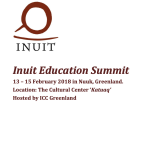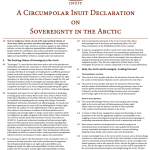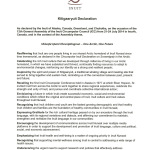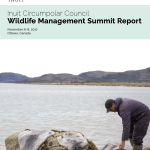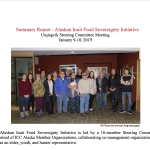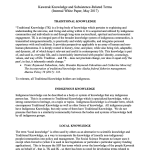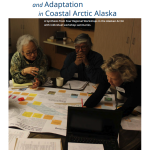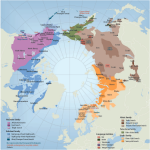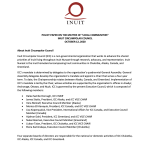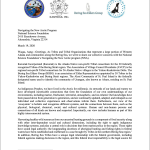Cultural and Language Systems
Inuit Education Summit
In recognition of the important role that education plays in economic, cultural, social, and political development of a people, and the critical education gaps faced by Inuit today, the delegates of the 2014 Inuit Circumpolar Council (ICC) General Assembly mandated the ICC Executive Council to hold an Inuit Education Summit prior to the next quadrennial ICC General Assembly in July 2018.
A Circumpolar Inuit Declaration on Sovereignty in the Arctic
We, the Inuit of Inuit Nunaat, are committed to this Declaration and to working with Arctic states and others to build partnerships in which the rights, roles and responsibilities of Inuit are fully recognized and accommodated.
Kitigaaryuit Declaration
As declared by the Inuit of Alaska, Canada, Greenland, and Chukotka, on the occasion of the 12th General Assembly of the Inuit Circumpolar Council (ICC) from 21-24 July 2014 in lnuvik, Canada, and in the context of the Assembly theme, Ukiuqta'qtumi Hivuniptingnun - One Arctic, One Future
Wildlife Management Summit Report
The Inuit Circumpolar Council (ICC) hosted the Wildlife Management Summit that took place on November 6 to 8, 2017 in Ottawa, Ontario, Canada to deliver on the commitment made in Article 40 of the Kitigaaryuit Declaration, as adopted at the 2014 ICC General Assembly in Inuvik, which, “directs ICC to plan and host an Inuit summit on wildlife management.” The ICC Wildlife Management Summit’s goal was to examine the influence that policies (international, regional, national instruments), environmental change, public perceptions, and changing social economic conditions in the Arctic are having
Summary Report - Alaskan Inuit Food Sovereignty Initiative: Utqiagvik Steering Committee
The Action Plan will empower our people to seek reform and justice as we collectively work towards securing access and management rights over our traditional food resources and to create long-term systematic and policy change that will advance food sovereignty and benefit Inuit communities throughout our four regions of Alaska.
Promoting Resilience and Adaptation in Coastal Arctic Alaska
This synthesis represents a summary of conversations during four workshops held in regional hub communities of Nome, Unalaska, King Salmon and Kotzebue. Over six months in 2016, almost 200 participants from 34 tribes, 14 state and federal agencies, local communities as well as several research institutions and nongovernmental organizations shared their insights on the most urgent risks and vulnerabilities for coastal communities and resources. They also identified key opportunities for collaboration between communities and agencies
A framework for co-production of knowledge in the context of Arctic research
For too long, Indigenous Peoples of the Arctic and their knowledges have not been equitably included in many research activities. We argue for systematic change in how research-related activities are conducted in the Arctic. Bringing together multiple knowledge systems, specifically Indigenous Peoples' knowledge systems and science, can lead to more equitable, inclusive, and useful outcomes. The co-production of knowledge framework that we forward is designed to assist researchers, decision makers, and communities in moving toward those goals.
Navigating the New Arctic NSF Comment Letter
Our organizations and communities are extremely concerned about environmental and other changes happening in the Arctic, as well as the research that is being funded and conducted on these topics. Our desire, and our request to you, is to work with us to create a collaborative, effective, and widely beneficial NSF funding mechanism.
Pagination
- Page 1
- Next page
